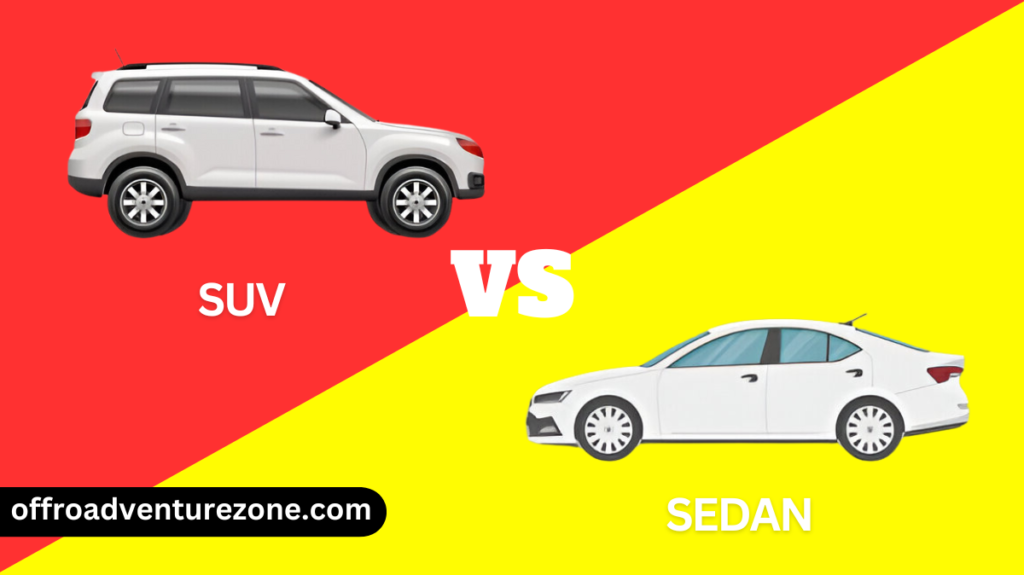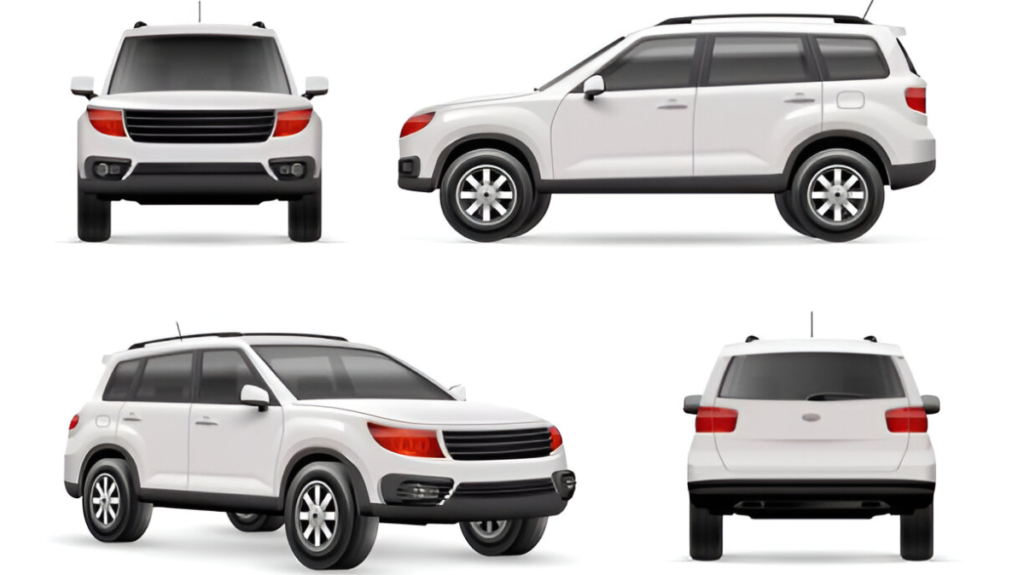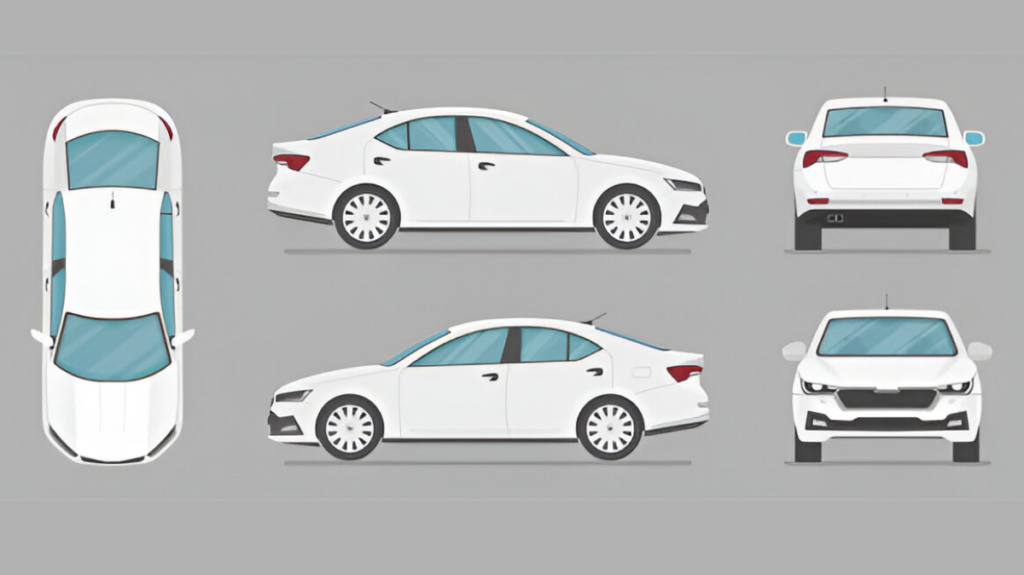When you’re looking to buy a car, you might wonder whether an SUV or a sedan is better for you. Both types of cars have their good points, and it’s important to know what makes them different. We will help you understand SUVs and sedans so you can choose the right car for you.

Contents
- 1 What is an SUV?
- 2 What is a Sedan?
- 3 Size and Space: Passenger and Cargo Capacity
- 4 Fuel Efficiency: Comparing Gas Mileage
- 5 Performance: Handling, Power, and Drivetrain
- 6 Cost: Price and Insurance Comparison
- 7 Safety Features: Crash Ratings and Technologies
- 8 Benefits of an SUV
- 9 Benefits of a Sedan
- 10 Which One is Right for You?
- 11 Conclusion
What is an SUV?
SUV stands for Sport Utility Vehicle. These cars are big and tall, and they’re made to be good at driving on different types of roads. SUVs usually look boxy and sit higher off the ground than other cars. They’re built to be strong and can carry lots of people and things.
Types of SUVs (Compact, Mid-Size, Full-Size)
SUVs come in different sizes to fit different needs. Compact SUVs are the smallest kind. They’re good for driving in cities because they’re easier to park and move around in tight spaces. They still have more room than most regular cars, but not as much as bigger SUVs.
Mid-size SUVs are bigger than compact ones. They’re popular with families because they have more space for kids, car seats, and all the stuff that comes with family life. They’re also good for people who like to go on road trips or carry lots of gear for sports or hobbies.
Full-size SUVs are the biggest type. They can carry the most people and things. Some full-size SUVs can seat up to eight people. They’re great for big families or for people who need to tow heavy things like boats or trailers.
What is a Sedan?
A sedan is a type of car that has been around for a long time. It usually has four doors and a separate trunk for carrying things. Sedans are lower to the ground than SUVs and have a smoother, more streamlined shape. They’re known for giving a comfortable ride and using less gas than bigger cars.
Types of Sedans (Compact, Mid-Size, Full-Size)
Like SUVs, sedans also come in different sizes. Compact sedans are the smallest. They’re great for people who mostly drive alone or with one other person. They’re easy to park and don’t use much gas, which makes them good for driving in cities.
Mid-size sedans are bigger and more comfortable than compact ones. They usually have enough room for five people to sit comfortably. Many families choose mid-size sedans because they’re a good mix of space and fuel efficiency.
Full-size sedans are the biggest type of sedan. They have lots of room inside for passengers and usually have big trunks for carrying things. Full-size sedans are often chosen by people who want a comfortable car for long drives or who need to carry adult passengers in the back seats often.
Size and Space: Passenger and Cargo Capacity
One of the biggest differences between SUVs and sedans is how much space they have inside. SUVs are generally bigger all around. They’re taller, which means there’s more headroom.
This can make them more comfortable for tall people. SUVs also usually have more space in the back for carrying things. This extra space is great for families, people with dogs, or anyone who needs to carry big items often.
Sedans have less space overall, but they can still be quite roomy. Most sedans can carry five people comfortably. The trunk of a sedan is separate from the passenger area.
This can be good because it keeps your things hidden and secure. However, it also means you can’t carry very tall or bulky items as easily as you can in an SUV.
Fuel Efficiency: Comparing Gas Mileage
Fuel efficiency means how far a car can go on a certain amount of gas. This is important because it affects how much money you spend on gas and how often you need to fill up your car. Sedans are usually more fuel-efficient than SUVs. This means they can go farther on the same amount of gas.
SUVs are heavier and bigger than sedans. They also often have more powerful engines. All of these things mean they usually need more gas to run. However, car makers are always working on making SUVs more fuel-efficient. Some newer SUVs, especially hybrid ones, can use almost as little gas as sedans.
Performance: Handling, Power, and Drivetrain
Performance is about how a car drives and handles different situations. SUVs and sedans can feel very different when you’re driving them. SUVs often have more powerful engines.
This means they can accelerate quickly and tow heavy things like boats or trailers. Many SUVs also come with four-wheel drive or all-wheel drive. This helps them drive better in snow, rain, or on dirt roads.
Sedans usually handle better on regular roads. They’re lower to the ground, which makes them feel more stable when you’re turning corners.
Sedans are often lighter than SUVs, which can make them feel quicker and more fun to drive, especially in cities. However, they’re not as good at handling rough roads or bad weather.
Cost: Price and Insurance Comparison
When you’re choosing between an SUV and a sedan, it’s important to think about how much they cost. This isn’t just about the price of buying the car. You also need to think about things like insurance, gas, and maintenance.
SUVs are usually more expensive to buy than sedans. They’re bigger and often have more features, which makes them cost more. Insurance for SUVs is often more expensive too. This is because they can cause more damage in accidents and are sometimes more likely to be stolen.
Sedans are usually cheaper to buy and insure. They also often cost less to maintain because their parts are smaller and easier to replace. Remember, though, that the exact cost depends on the specific car you choose. Some luxury sedans can be more expensive than basic SUVs.
Safety Features: Crash Ratings and Technologies
Safety is very important when choosing a car. Both SUVs and sedans can be very safe, but they have different safety advantages. SUVs are bigger and sit higher off the ground. This can make them safer in some types of crashes. In a crash with a smaller car, people in the SUV are less likely to get hurt.
Sedans have their own safety advantages. They’re often more stable because they’re lower to the ground. This makes them less likely to roll over. Sedans can also stop more quickly and are often better at avoiding accidents in the first place.
Both SUVs and sedans can come with advanced safety features. These might include things like airbags, anti-lock brakes, and systems that help prevent crashes. When you’re choosing a car, it’s a good idea to look at its safety ratings and see what safety features it has.
Benefits of an SUV

Higher Ground Clearance
One big advantage of SUVs is that they sit higher off the ground. This is called ground clearance. Higher ground clearance is helpful in several ways.
First, it makes it easier to drive over bumps, potholes, or rough roads without damaging the bottom of the car. This can be really useful if you live somewhere with bad roads or if you like to go camping or to places with dirt roads.
Higher ground clearance also means you sit higher when you’re driving. This gives you a better view of the road ahead. Many people feel safer when they can see more of what’s around them. It can also make it easier to see over other cars in traffic.
More Cargo Space
Another big benefit of SUVs is that they have lots of space for carrying things. This extra space can be really helpful in many situations.
If you have a big family, you can use the space for strollers, sports equipment, or bags for trips. If you like outdoor activities, you can easily fit bikes, camping gear, or surfboards.
Many SUVs also have seats that can fold down to make even more space. This means you can carry big items like furniture or large boxes when you need to. Some SUVs even have three rows of seats. When you’re not using all the seats for people, you can fold them down for extra cargo space.
Off-Road Capabilities
Many SUVs are built to handle driving off regular paved roads. This is called off-road driving. SUVs often have features that make them good at this. For example, many have four-wheel drive or all-wheel drive. This means the engine sends power to all four wheels, which helps the car grip the road better in slippery conditions.
SUVs also usually have more powerful engines and stronger frames than sedans. This helps them climb steep hills and drive over rough ground. Some SUVs even have special features for off-road driving, like systems that control how the wheels spin on different surfaces.
Ideal for Families and Adventure
SUVs are very popular with families for several reasons. They have lots of space for kids, car seats, strollers, and all the other things that come with family life. Many SUVs have features that are great for families, like entertainment systems to keep kids happy on long drives, or easy-to-clean interiors for when messes happen.
SUVs are also great for people who like adventure. If you enjoy camping, hiking, skiing, or other outdoor activities, an SUV can be a great choice. You can easily carry all your gear, and the off-road capabilities mean you can get to out-of-the-way places. Many SUVs can also tow trailers or boats, which opens up even more possibilities for adventure.
Benefits of a Sedan

Better Fuel Efficiency
One of the biggest advantages of sedans is that they usually use less gas than SUVs. This is because sedans are lighter and have a more aerodynamic shape, which means they can slip through the air more easily.
Using less gas is good for a couple of reasons. First, it saves you money because you don’t have to buy gas as often. Second, it’s better for the environment because using less gas means putting fewer harmful emissions into the air.
Some sedans are especially good at saving gas. Hybrid sedans, which use both gas and electricity, can go even further on a tank of gas. There are also all-electric sedans that don’t use any gas at all.
Smoother Ride Quality
Sedans are known for giving a smooth, comfortable ride. This is partly because they’re lower to the ground than SUVs. Being closer to the road helps sedans feel more stable, especially when you’re turning corners or driving at high speeds on the highway.
Sedans also usually have softer suspensions than SUVs. The suspension is the system that absorbs bumps and vibrations from the road. A softer suspension means you feel fewer bumps when you’re driving. This can make long drives more comfortable and enjoyable.
Lower Maintenance Costs
Another benefit of sedans is that they often cost less to take care of than SUVs. There are a few reasons for this. First, sedans use less gas, so you spend less money filling up the tank. Second, parts for sedans are often cheaper than parts for SUVs because they’re smaller and more common.
Sedans also often need less frequent maintenance. For example, because they’re lighter, their brakes and tires might not wear out as quickly as those on a heavier SUV. All of this can add up to significant savings over time.
Better Suited for City Driving
Sedans are often a great choice if you do most of your driving in a city. They’re smaller than SUVs, which makes them easier to maneuver on busy streets and in tight parking spaces. If you’ve ever tried to parallel park a big car on a crowded street, you know how helpful it can be to have a smaller vehicle!
The better fuel efficiency of sedans is also a big plus in city driving. In the city, you often have to stop and start a lot because of traffic lights and congestion. Sedans, especially hybrid ones, are often designed to handle this kind of driving efficiently.
Which One is Right for You?
Lifestyle and Family Needs
When you’re trying to decide between an SUV and a sedan, one of the most important things to think about is your lifestyle. Think about what you do every day and what kind of car would make your life easier.
If you have a big family or often drive around lots of people, an SUV might be a good choice. The extra space can be really helpful for car seats, sports equipment, or just giving everyone room to spread out on long drives.
SUVs are also great if you have dogs, especially big ones, because there’s plenty of space for them to ride comfortably.
Commuting vs Road Trips
| Aspect | SUV | Sedan |
| Commuting | Higher fuel costs, easier parking | Better fuel efficiency, agile |
| Road Trips | More space, comfortable, off-road | Smooth ride, less fuel stops |
Budget Considerations
Of course, you also need to think about how much money you want to spend. This isn’t just about the price of buying the car. You also need to think about how much it will cost to own the car over time.
SUVs usually cost more to buy than sedans. They also often use more gas and can be more expensive to insure and maintain. If you’re trying to save money, a sedan might be a better choice.
Conclusion
Choosing between an SUV and a sedan depends on your specific needs and preferences. SUVs offer more space and versatility, while sedans provide better fuel efficiency and lower costs. Consider your lifestyle, budget, and driving habits to make the best choice for you.
What’s the main difference between an SUV and a sedan?
The main difference is size and shape. SUVs are larger, taller, and have more cargo space. Sedans are lower to the ground and generally more fuel-efficient.
Are SUVs safer than sedans?
Both can be safe. SUVs are larger and sit higher, which can be advantageous in some crashes. Sedans are often more stable and can avoid accidents more easily. Safety also depends on the specific model and its features.
Which is better for families, an SUV or a sedan?
SUVs are often preferred by families due to their extra space for passengers and cargo. However, many families also use sedans successfully, especially those with younger or fewer children.
Do SUVs always have worse gas mileage than sedans?
Generally, yes. SUVs are typically heavier and less aerodynamic, which means they use more fuel. However, some modern SUVs, especially hybrids, can have fuel efficiency close to that of sedans.
Can sedans go off-road?
Most sedans are not designed for off-road use. They sit lower to the ground and usually don’t have four-wheel drive. Some sedans can handle light off-road conditions, but for serious off-roading, an SUV is a better choice.
